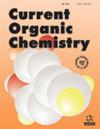Synthesis, Structure, and Antimicrobial Properties of New Cobalt(II) Complexes with 1-Propargylimidazoles
IF 2.1
3区 化学
Q3 CHEMISTRY, ORGANIC
引用次数: 0
Abstract
: Complexes of cobalt(II) chloride with 1-propargylimidazole, 1-propargyl-2-methylimidazole, and 1- propargylbenzimidazole ligands were synthesized and studied by FTIR spectroscopy and X-ray analysis. According to the X-ray analysis, the crystal molecules of compounds were connected by non-covalent interactions, such as halogen bonds and π-stacking. The nature and energy of coordination metal-ligand and noncovalent bonds for structures under study were estimated in the frame of QTAIM (Quantum Theory “Atoms In Molecules”). The antimicrobial activity of obtained cobalt(II) chloride complexes was evaluated in relation to microorganisms, E. durans, B. subtilis, and E. coli. Complexes of 1-propargyl-2-methylimidazole and 1- propargylbenzimidazole with cobalt(II) chloride demonstrated high activity against E. coli and E. durans relatively and could be recommended as antimicrobial drugs.1-Propargylimidazoles 的新钴(II)配合物的合成、结构和抗菌特性
:合成了氯化钴(II)与 1-丙炔基咪唑、1-丙炔基-2-甲基咪唑和 1-丙炔基苯并咪唑配体的配合物,并通过傅立叶变换红外光谱和 X 射线分析进行了研究。根据 X 射线分析,化合物的晶体分子通过卤素键和π堆叠等非共价相互作用连接在一起。在 QTAIM("原子在分子中 "量子理论)的框架内,对所研究结构的金属配位键和非共价键的性质和能量进行了估算。对所获得的氯化钴(II)络合物的抗菌活性进行了评估,这些络合物与微生物(杜氏大肠杆菌、枯草杆菌和大肠杆菌)有关。1- 丙炔基-2-甲基咪唑和 1- 丙炔基苯并咪唑与氯化钴(II)的络合物对大肠杆菌和杜兰氏菌表现出较高的活性,可推荐用作抗菌药物。
本文章由计算机程序翻译,如有差异,请以英文原文为准。
求助全文
约1分钟内获得全文
求助全文
来源期刊

Current Organic Chemistry
化学-有机化学
CiteScore
3.70
自引率
7.70%
发文量
76
审稿时长
1 months
期刊介绍:
Current Organic Chemistry aims to provide in-depth/mini reviews on the current progress in various fields related to organic chemistry including bioorganic chemistry, organo-metallic chemistry, asymmetric synthesis, heterocyclic chemistry, natural product chemistry, catalytic and green chemistry, suitable aspects of medicinal chemistry and polymer chemistry, as well as analytical methods in organic chemistry. The frontier reviews provide the current state of knowledge in these fields and are written by chosen experts who are internationally known for their eminent research contributions. The Journal also accepts high quality research papers focusing on hot topics, highlights and letters besides thematic issues in these fields. Current Organic Chemistry should prove to be of great interest to organic chemists in academia and industry, who wish to keep abreast with recent developments in key fields of organic chemistry.
 求助内容:
求助内容: 应助结果提醒方式:
应助结果提醒方式:


